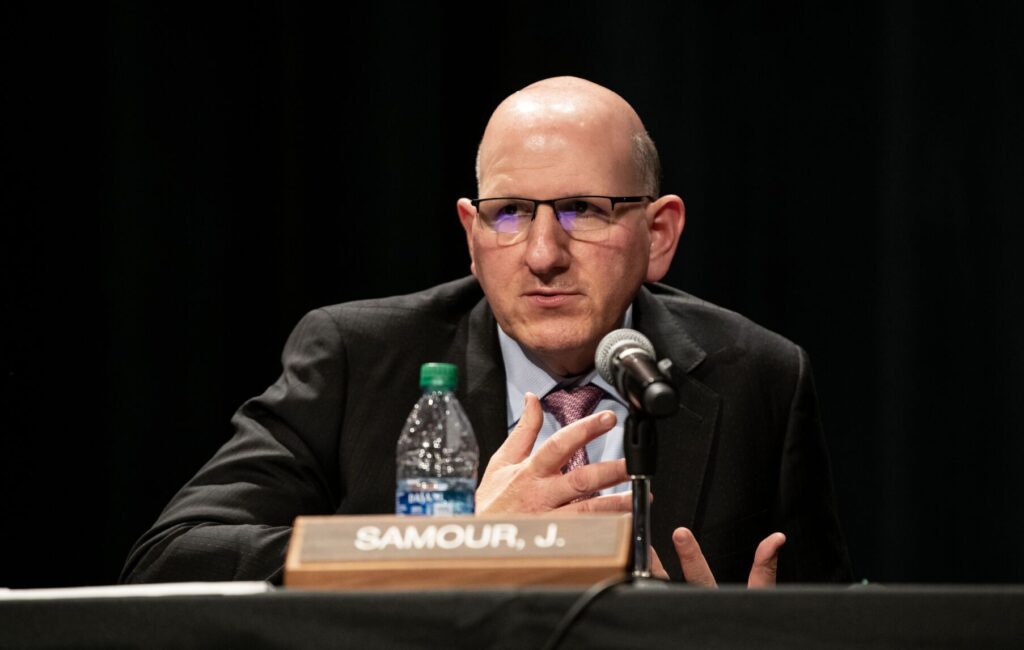Congress seeks ways to stop opioid addiction and deaths
WASHINGTON – Congress sought answers Thursday to the opioid crisis that is killing more people every year in Colorado and elsewhere.
Opioids are painkillers that can become addictive with continued use. An overdose can be deadly, killing as many as 33,000 people in the United States last year, according to National Center for Health Statistics.
“Jails throughout Colorado have been overwhelmed by people suffering from the effects of opioid addiction,” Colorado U.S. Sen. Michael Bennet said during the hearing in Washington, D.C.
He expressed concern for low-income persons who receive Medicaid for their health treatments. They lose Medicaid benefits when they are incarcerated, cutting them off from government-subsidized drug treatment.
“Does that make any sense for us to cut off their access to treatment or to funds,” Bennet (D) asked a panel of medical experts.
He said opioids and similar drugs killed 442 people in Colorado last year, a rate that more than quadrupled in less than 20 years. The synthetic opioid called fentanyl was the most common culprit.
“We must find a better way to help those 25 million Americans who suffer from pain on a daily basis,” said Francis Collins, director of the National Institutes of Health.
One solution could be development of new painkillers that do not activate brain centers associated with pleasure, which makes them addictive, according to several witnesses at the hearing of the House Committee on Health, Education, Labor and Pensions.
They also advocated wider access to addiction treatment and more education for health care personnel on the hazards of opioids.
The congressional hearing follows an announcement last month by Colorado Attorney General Cynthia Coffman that she is joining 41 state attorneys general in seeking information that might implicate pharmaceutical companies in abuse of prescription opioids.
“The opioid epidemic has had a devastating impact on millions of families across the country and Colorado has certainly not been immune to this crisis,” Coffman said in a statement.
The coalition of attorneys general has served subpoenas on pharmaceutical manufacturers Endo International, Janssen Pharmaceuticals, Teva Pharmaceutical Industries Ltd./Cephalon Inc., Allergan and a supplemental subpoena to Purdue Pharma. They also sent information demand letters to opioid distributors AmerisourceBergen, Cardinal Health and McKesson.
The three distributors together reported more than $400 billion in revenue last year and manage 90 percent of the nation’s drug distribution, according to the trade group Drug Channels Institute.
Before the 1990s, opioids were rarely prescribed to treat pain. Now, as many as 200 million opioid prescriptions are written in the United States each year.
The attorneys general want to review the marketing, sales and distribution practices of the companies to see whether they overstepped legal business tactics.
At this point the coalition’s actions are investigatory. They have not yet decided on a legal strategy against the companies.
In 2013, Colorado organized the Colorado Consortium for Prescription Drug Abuse Prevention to coordinate the state’s response to the opioid crisis. The Consortium joined efforts of 10 working groups to address education, treatment, research and other drug abuse issues.
Several states and local governments have filed lawsuits against drug companies that manufacture or distribute opioids.
The pharmaceutical companies being investigated responded with statements similar to Cardinal Health, which said, “We do not manufacture, promote or prescribe prescription medications to members of the public – and believe everyone in that chain, including us, must do their part to address the current crisis.”
The trade group Healthcare Distribution Alliance said it would cooperate with authorities to resolve opioid problems but prescription drug abuse should not be blamed on distributors.
In August, the Alliance suggested in a public comment on opioid abuse that the U.S. Drug Enforcement Administration use more sophisticated computerized algorithms to identify “suspicious orders.” Suspicious orders flagged by the monitoring system would be followed by investigations.
Typically, suspicious orders are made by doctors “with whom the patient has no prior relationship” or pharmacists who fill prescriptions based on online questionnaires from doctors, the Healthcare Distribution Alliance said in its public comment.
In August, President Donald Trump described the growing abuse of opioids as “an emergency.”
Colorado’s most recent effort to control opioid abuse was announced in July, when the Colorado Department of Health Care Policy and Financing instituted new rules on dispensing the drugs to Medicaid patients.
The department administers Medicaid for low-income residents under the program name of Health First Colorado.
The new restrictions limit the supply of opioids to Health First Colorado members who have not had a prescription in the past year. The most recent phase of the restrictions took effect last week.
They are a response to an analysis that showed patients use opioids more frequently after their first prescription, possibly leading to addiction.
“The goal of this new policy is twofold,” Judy Zerzan, the department’s chief medical officer, said in a statement. “First, to reduce the number of Medicaid members who might develop an addiction to opioids when it could be prevented. Second, to reduce the amount of excess opioid pills in the community.”











